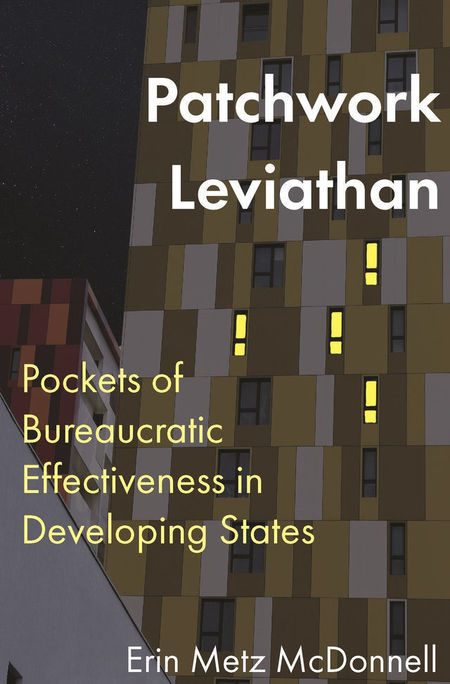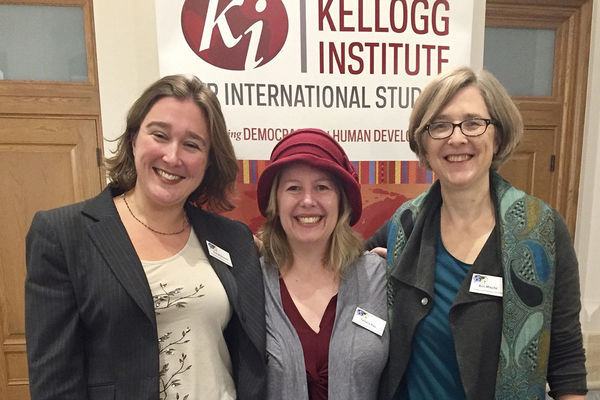
Faculty Fellow Erin McDonnell is one of nine University of Notre Dame faculty members to receive National Science Foundation Early Career Development (CAREER) Awards for 2020.
Since 2014, Notre Dame faculty have earned 49 NSF CAREER Awards – which provide five years of support to early-career faculty who “have the potential to serve as academic role models in research and education and to lead advances in the mission of their department or organization.”
McDonnell is one of two Arts and Letters faculty, along with psychologist Nathan Rose, to receive the honor this year.
“This is the most prestigious award granted by the NSF to early-career faculty and reflects the quality of Erin McDonnell’s and Nathan Rose’s research,” said Sarah Mustillo, the I.A. O’Shaughnessy Dean of the College of Arts and Letters. “I am thrilled that they are continuing the College’s strong record of success with these awards.”
McDonnell, an associate professor of sociology, was recognized for her project, “Pockets of Effectiveness and the Diffusion of Organizational Capacity,” which explores areas of organizational excellence within the Ghanaian state.
“This award really sets a platform for the next five years of my life,” McDonnell said. “It structures the major moments and movements of my career, charting this path and making it possible to do this really ambitious research I wouldn’t have been able to do otherwise.”
“The resources that the University brings together through the College, the Kellogg Institute, and the Keough School of Global Affairs in terms of faculty and support is just unparalleled,” she said. “Just being in an environment where I’m talking constantly with colleagues in sociology and economics and political science who work on development – it refines your thinking in a way that is enormously helpful. That kind of robust, intellectual community was priceless for making this happen.”
Pockets of Effectiveness
 McDonnell’s research explores questions emerging from her most recent book project, Patchwork Leviathan: Pockets of Bureaucratic Effectiveness in Developing States.
McDonnell’s research explores questions emerging from her most recent book project, Patchwork Leviathan: Pockets of Bureaucratic Effectiveness in Developing States.
That project examined groups or agencies in the public sector, especially in low-income states that are typically seen as weak and ineffectual, that are nevertheless incredibly effective.
“The book looks at these groups, organizationally, how they work and how they seem to get started,” she said. “But one of the natural questions that come next is – can they spread? We want to know if this can become the norm throughout the area.”
Her next project tackles that question directly using a case study of the commercial courts in Ghana, which were founded in 2005 and became extraordinarily effective, in terms of their caseload and case closure rate, as well as the level of satisfaction reported by people with experiences in the courts.
McDonnell is now tracking efforts put forth to intentionally spread that success elsewhere within the Ghanaian judicial system – including a move to use the commercial courts in the capital as a template for how to run courts in different regions of the country.
“Tracking those efforts in real time gives us an analytic means of trying to gain traction on this question of how successful pockets can spread,” she said. “And this case in particular allows us to avoid a number of confounding factors we might see when we try to transfer a successful model to another context – like crossing cultural or national boundaries. Those factors are silenced here because we are moving within the same country and the same kind of judicial system.”
Research and teaching intertwined
Once travel restrictions related to the coronavirus pandemic are lifted, McDonnell plans to travel to Ghana with a team of undergraduate student research assistants, to observe court proceedings and interview key members of the court system.
“The CAREER Award is focused on research and teaching being very intertwined,” she said, “and I’m excited about the mentorship component of this project, both in terms of ways I can integrate this data into my classes and in terms of including students in the research process.”
The project will also include an annual workshop that will bring together advanced graduate students in different disciplines – including political science, sociology, public administration, and psychology – from across the US to examine issues surrounding effective statecraft.
McDonnell plans to launch the workshop via Zoom this year and hopes to transition to an in-person workshop in future years.
“To bring together a group of dedicated young scholars to have these conversations across disciplines is really exciting,” McDonnell said. “Many of these graduate students may be in a department where there are few, if any, mentors who’ve done work in developing countries. Bringing them into dialogue with each other will stimulate and refine our ideas and bring into being a new area of research.”
A robust intellectual community
 McDonnell, who has established a relationship with a group within the World Bank that works on public sector delivery improvement, said it has been especially rewarding to see how academic ideas can contribute to structuring programs that improve the lives of public servants.
McDonnell, who has established a relationship with a group within the World Bank that works on public sector delivery improvement, said it has been especially rewarding to see how academic ideas can contribute to structuring programs that improve the lives of public servants.
“Obviously, I hope this research will have a scholarly impact in terms of helping shape the understanding of these practices and broadening the extent to which scholars think about cases in Africa as important for theorizing,” she said. “But I also hope that it has a real-world impact by helping to inform development practices.”
McDonnell, who holds a concurrent appointment in the Department of Africana Studies, said that Notre Dame is one of the best places in the country to be doing international research, particularly in low-income countries.
“The resources that the University brings together through the College, the Kellogg Institute, and the Keough School of Global Affairs in terms of faculty and support is just unparalleled,” she said. “Just being in an environment where I’m talking constantly with colleagues in sociology and economics and political science who work on development – it refines your thinking in a way that is enormously helpful. That kind of robust, intellectual community was priceless for making this happen.”
This story first appeared on sociology.nd.edu





